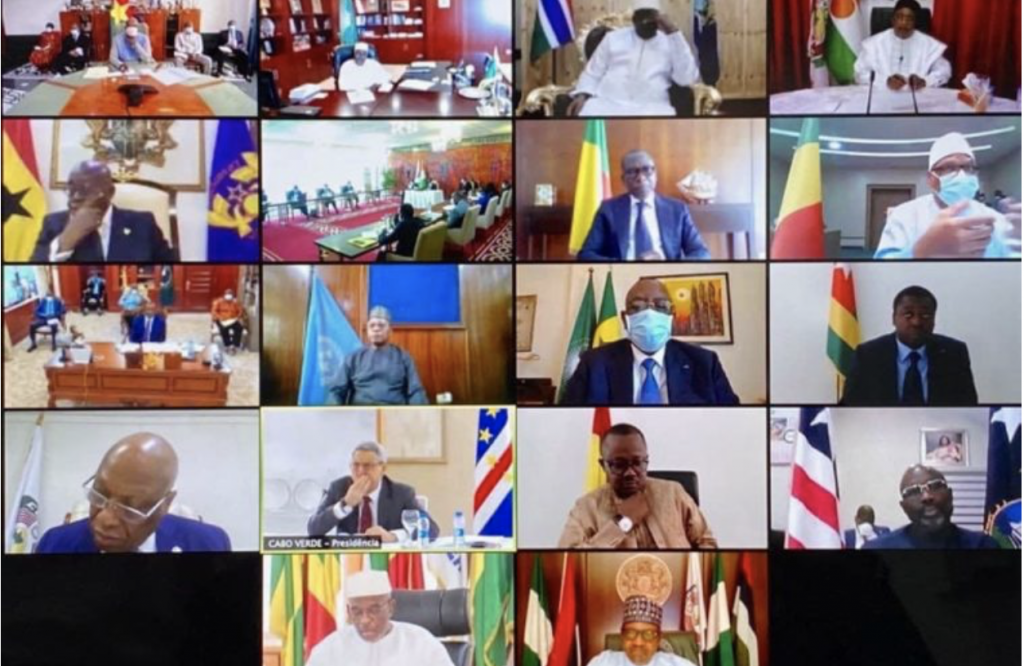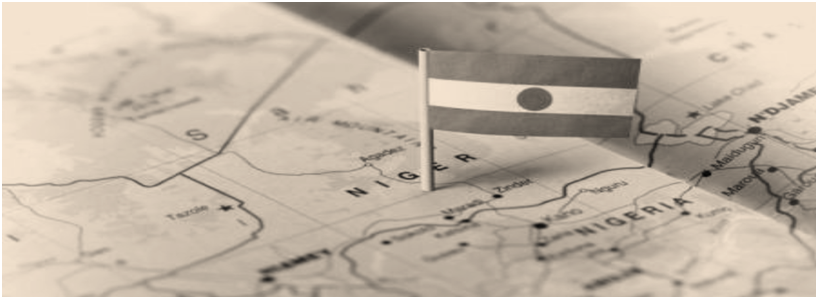
Weekly Highlight
- Covid-19: 12 new confirmed cases, in total 696 including 350 cured and 29 deaths (Sunday April 26)
- Clashes in Niger capital over virus curfew and 10 jailed post the violence
- Niger reports new polio outbreak
- Niger exchange rate – Exchange rates West African CFA franc – USD = 604.628 XOF XOF= 0.00165391 USD
EXECUTIVE SUMMARY
Covid-19: 12 new confirmed cases, in total 696 including 350 cured and 29 deaths (Sunday April 26)
According to the update from the Ministry of Public Health on Sunday April 26, Niger has confirmed 12 new positive cases and two (02) deaths. Of these positive cases three (03) come from the Zinder region, and nine (09) from the Niamey region. This brings the total number of cases to 696 including 350 cured, 317 in treatment and 29 deaths.
Clashes in Niger capital over virus curfew and 10 jailed post the violence
Clashes erupted in Niamey, the capital of the Sahel nation of Niger, over government’s anti-corona-virus curfew and a ban on prayer gatherings. Violence broke out just after 8pm on Sunday 19th in the rundown district of Lazaret, where security forces used teargas to disperse a crowd of people who wanted to hold prayers in a mosque. Protesters, most of them young people, burned tires and blocked streets with rocks. Similar protests erupted in other parts of the city and continued until late according to witnesses and images posted on local media. It was reported on 21 Apr that 10 individuals were jailed post the violent protests.
Niger reports new polio outbreak
Niger has reported a new polio outbreak that has affected two children in Niamey and Tillaberi region, the World Health Organization (WHO) said on 24th Apr 20. Last December, the West African country along with Kenya and Mozambique reported ending polio outbreaks that had lasted 24 months. However, this new circulating vaccine-derived poliovirus transmission, that paralysed a child on February 15, is not linked to the outbreak that was closed last year. “Niger stopped the previous polio outbreaks by mounting high quality mass vaccination campaigns in 2019. Unfortunately, that will not be possible now as we have suspended the polio mass vaccination campaigns due to the novel coronavirus (COVID-19) pandemic responses that requires global standards for social distancing and hand washing hygiene practices,” said Dr Pascal Mkanda, Coordinator of Polio Eradication Programme in the African Region.
Donation of Ramadan Kits to SDF families: Turkey helps 800 SDF households
The annex of the Ministry of National Defense served as a framework, yesterday, April 22, 2020, for the reception of Ramadan kits, offered by the Republic of Turkey, through the Turkish Agency for Cooperation and Coordination (TIKA). It was the Minister of National Defense, Pr Issoufou Katambé and the Ambassador of Turkey to Niger, H.E Mustafa Turker Ari, who presided over the donation ceremony, in the presence of several civilian and military guests. 800 households of the Niger Defense and Security Forces (SDS) will each benefit from a 35 kg kit, including 1 bag of 25 kg rice, 5 kg of sugar and 5 litres of oil.
Presentation of a food donation by the Tattali Iyali Foundation
The Tattali Iyali Foundation has donated food including rice, millet and dates to the widows and orphans of soldiers and gendarmes who fell on the field of honor in the fight against terrorism. It is 5 tonnes of rice, 5 tonnes of millet and 200 boxes of dates that the Foundation made available to widows and orphans of soldiers and gendarmes who fell on the field of honor as part of the fight against terrorism. This gesture, which takes place at the beginning of the blessed month of Ramadan, is a tradition for the President of the Tattali Iyali Foundation.
USEFUL INFORMATION
List of holidays in Niger 2020
Exchange rates West African CFA franc
According to our most recent information (27th April 2020) the West African CFA franc has the following exchange rates.
The exchange rate from your own bank or credit card company will differ somewhat from the exchange rates as mentioned above. Your bank or credit card company might also apply additional international charges.
| USD = 604.628 XOF | XOF= 0.00165391 USD |
| EUR = 655.957 XOF | XOF= 0.00152449 EUR |
| **As at 27 April 2020 |
FREQUENTLY ASKED QUESTIONS ABOUT CORONA-VIRUS DISEASE (COVID-19)
COVID-19 Basics
Q: What is COVID-19?
A: COVID-19 is a virus strain, first identified in Wuhan, Hubei Province, China, that has only spread in people since December 2019.
Health experts are closely monitoring the situation because little is known about this new virus and it has the potential to cause severe illness and pneumonia in some people.
Q: How does COVID-19 spread and what are the symptoms?
A: COVID-19 is primarily spread through respiratory droplets. That means to become infected, you generally must be within six feet of someone who is contagious and come into contact with these droplets. It may be possible to get COVID-19 by touching a surface or object that has the virus on it and then touching your mouth, nose, or possibly their eyes, Symptoms of COVID-19 appear within two to 14 days after exposure and include fever, cough, diarrhea and shortness of breath.
Q: How long does it take for symptoms of the COVID-19 to appear?
A: The CDC believes that symptoms of COVID-19 may appear in as few as two days, or as long as 14 days after exposure.
Q: How is COVID-19 treated?
A: There is currently no FDA approved medication for COVID-19. People infected with the virus should receive supportive care such as rest, fluids and fever control, to help relieve symptoms. For severe cases, treatment should include care to support vital organ functions.
Prevention
Q: Is there a vaccine?
A: Currently, there is no vaccine available.
Q: How can I best protect myself?
A: Practice the following:
- Wash your hands with soap and water for at least 15-20 seconds. If soap and water are not available, use a hand sanitizer with at least 60% alcohol.
- Avoid touching your eyes, nose and mouth with unwashed hands.
- Avoid close contact (within 6 feet) with people who are sick.
- Stay home when you are sick.
- Cover your cough or sneeze with a tissue, then throw the tissue in the trash.
- Standard household cleansers and wipes are effective in cleaning and disinfecting frequently touched objects and surfaces.
- It’s currently flu and respiratory disease season and CDC recommends getting vaccinated, taking every preventive actions to stop the spread of germs, and taking flu antivirals if prescribed.
Q: Should I wear a face mask? Will that help protect me?
A: If you are sick: You should wear a facemask when you are around other people (like sharing a room or vehicle) and before you enter a building. If you are not able to wear a facemask (for example, because it causes trouble breathing), then you should do your best to cover your coughs and sneezes, and people who are caring for you should wear a facemask if they enter your room.
If you are not sick: You do not need to wear a facemask unless you are caring for someone who is sick (and they are not able to wear a facemask). Facemasks may be in short supply and they should be saved for caregivers.
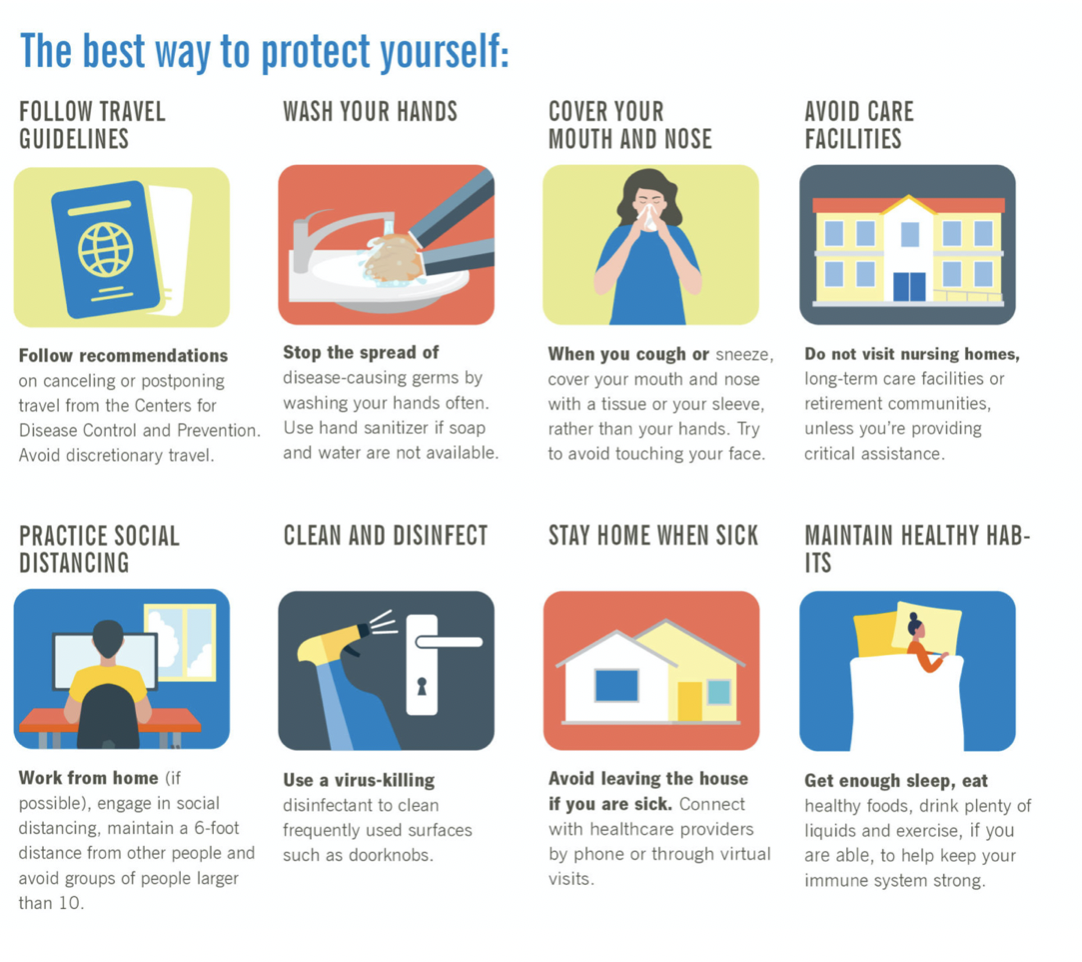
MEDICAL REQUIREMENTS AND INFORMATION
Vaccinations required to enter the country
Proof of vaccination against yellow fever is required over one year of age entering the country. The government of Niger recommends vaccine for travelers departing Niger.
Recommended Travel Vaccinations for Niger
|
|||||||||||||||||||||||||||||||||||||||||||||||||||
NIGER SECURITY & RISK LEVELS
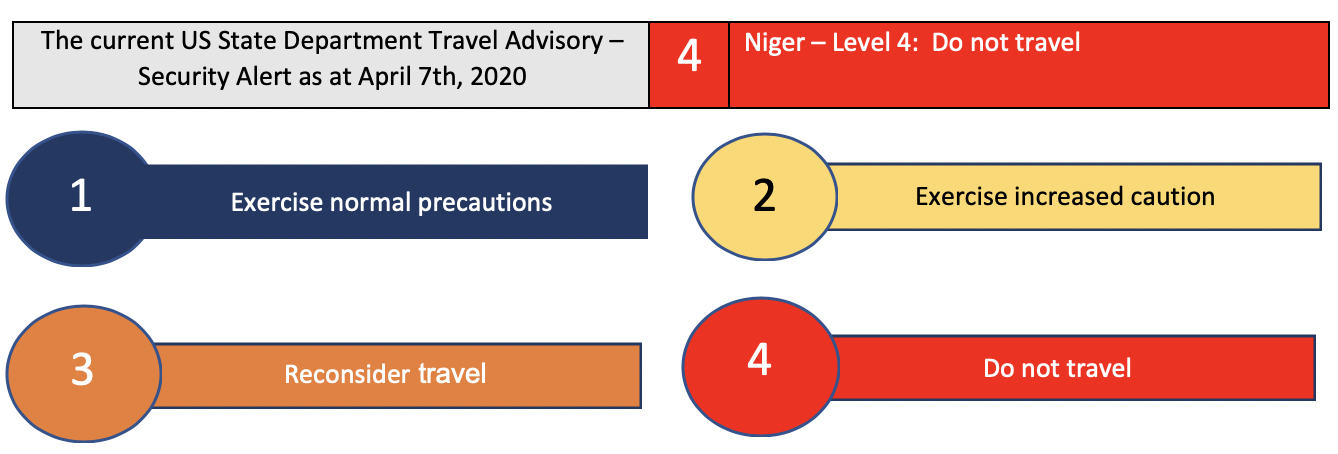
Global Health Advisory
The Department of State advises U.S. citizens to avoid all international travel due to the global impact of COVID-19. In countries where commercial departure options remain available, U.S. citizens who live in the United States should arrange for immediate return to the United States, unless they are prepared to remain abroad for an indefinite period.
At present the Department of State is making every effort to assist U.S. citizens overseas who wish to return to the United States. As the Covid-19 situation develops, our ability to provide such assistance working with commercial airlines or arranging for evacuation flights may become more limited or even unavailable. In recent weeks, commercial airlines have significantly reduced flight schedules and countries have closed airports and borders with little advance notice. If you wish to return to the United States, you should make arrangements to do so now and contact the nearest U.S. Embassy or Consulate for assistance as needed. There is no guarantee that the Department of State will be able to continue to provide repatriation assistance and transportation options to the United States may be unavailable in the future. If you choose to remain overseas, you should be prepared to remain where you are for the foreseeable future.
U.S. citizens who live abroad should avoid all international travel. Many countries are experiencing COVID-19 outbreaks and implementing travel restrictions and mandatory quarantines, closing borders, and prohibiting non-citizens from entry with little advance notice. Airlines have cancelled many international flights and several cruise operators have suspended operations or cancelled trips. If you choose to travel internationally, your travel plans may be severely disrupted, and you may be forced to remain outside of the United States for an indefinite timeframe.
On March 14, the Department of State authorized the departure of U.S. personnel and family members from any diplomatic or consular post in the world who have determined they are at higher risk of a poor outcome if exposed to COVID-19 or who have requested departure based on a commensurate justification. These departures may limit the ability of U.S. Embassies and consulates to provide services to U.S. citizens.
If you decide to travel abroad or are already outside the United States:
- Consider returning to your country of residence immediately using whatever commercial means are available.
- Have a travel plan that does not rely on the U.S. Government for assistance.
- Review and follow theCDC’s guidelines for the prevention of coronavirus.
- Check with your airline, cruise lines, or travel operators regarding any updated information about your travel plans and/or restrictions.

NIGER INCIDENT MAPPING
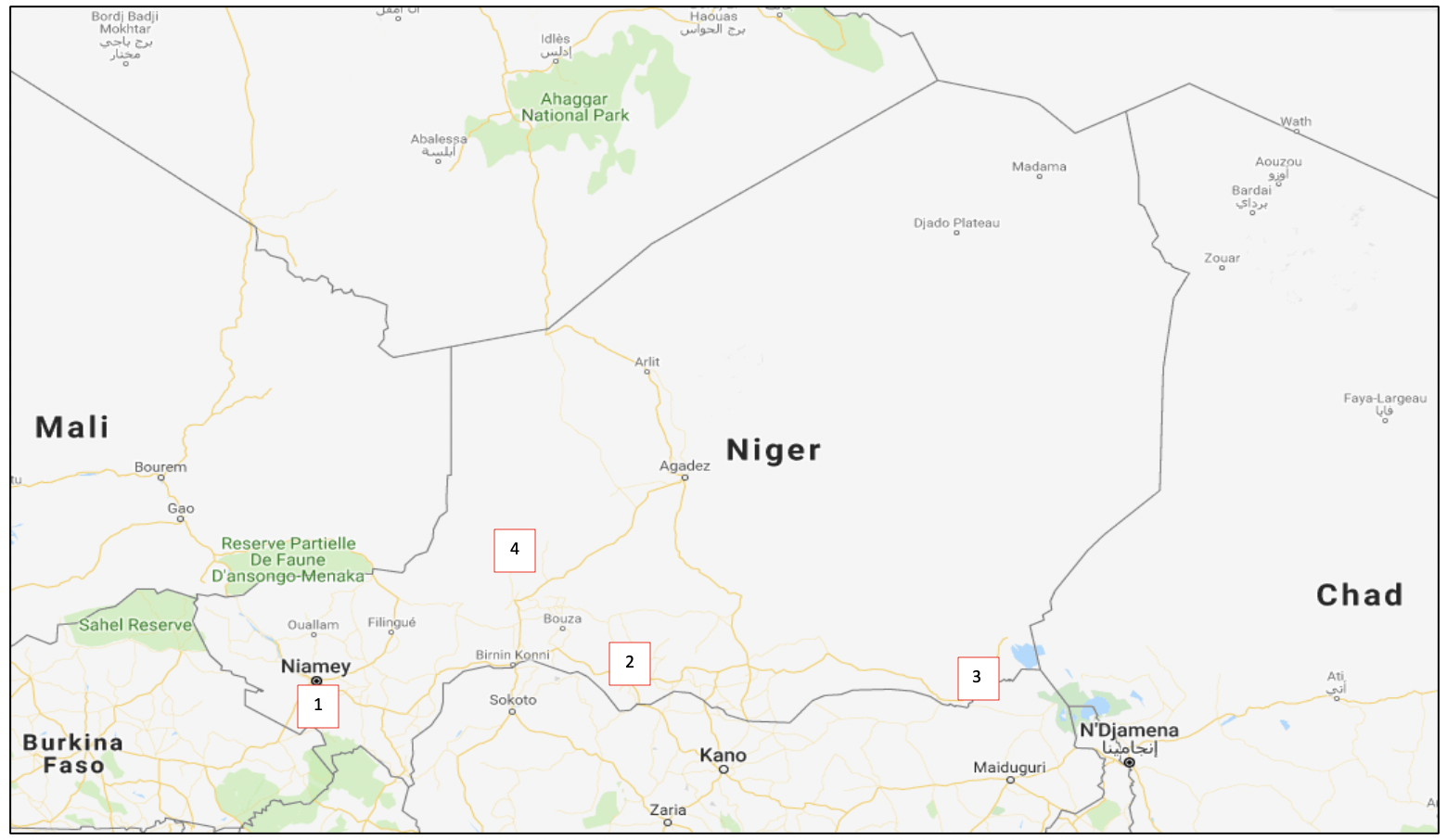
NIGER INCIDENTS IN DETAIL
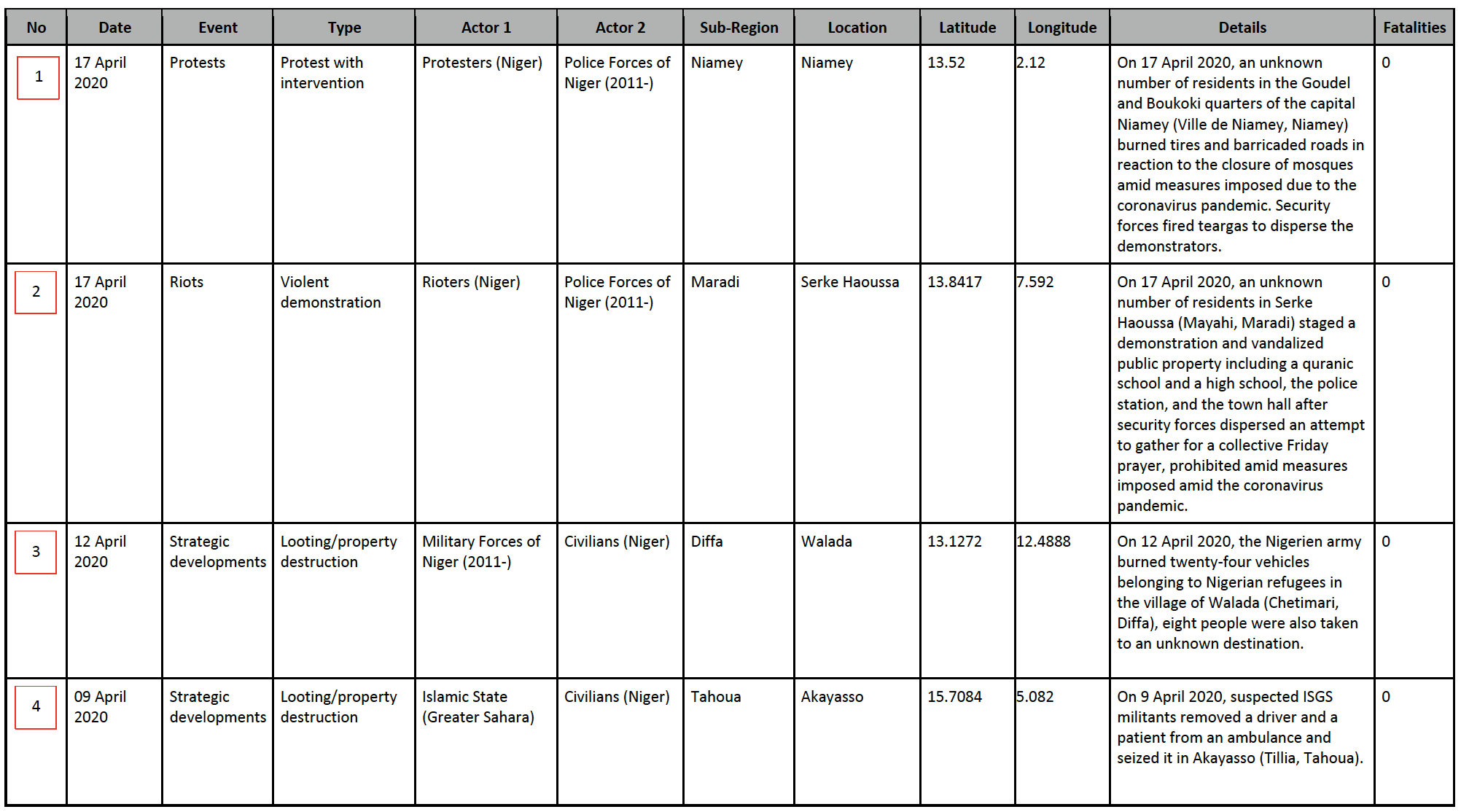
Covid-19: Niger fears new violence as Ramadan approached
The approach of Ramadan raises fears of an outbreak of violence in Niger, where riots have broken out in several cities against the curfew and the ban on collective prayers, decreed to fight against the spread of the coronavirus.
“We just want to pray in our mosques, without violence, nothing more and we are determined to exercise this religious right”, threatens Hassane Dari, a young merchant of Lazaret, a popular district of Niamey, interviewed by AFP.
We couldn’t do the collective prayers on Fridays and we also want to prevent us from praying during the blessed month of Ramadan? It’s not going to happen like this, Revolted Hadjia Aïssa, a housewife from Banizoumbou, a neighborhood close to Lazaret.
The unrest began a month ago in a locality in the center of this deeply Muslim country, as soon as the government announced measures to combat the epidemic, in particular the closure of mosques, before spreading to the capital for almost a week. Law enforcement officials have arrested nearly 300 people in recent days, as Ramadan is soon to begin in this very poor West African country.
Although Niger is relatively little affected by the coronavirus epidemic, with 657 cases including 20 deaths according to an official report on Tuesday, the authorities had taken drastic measures from the start a month ago to stop its spread: border closure , state of emergency, curfew, closure of places of worship and schools, isolation of Niamey from the rest of the country.
The riots began on March 23 in the locality of Mirrya (central Zinder region), where young people armed with clubs and edged weapons burnt buildings and vehicles, according to the authorities.
POLITICAL OVERVIEW
The president of the Court of Appeal of Niamey, at the public hearing of vacation of April 22, 2020, ruling on the matter of summary procedure, delivered judgment n ° 021 in the case: Mr Oumarou Noma interim president of the party Moden FA Lumana Africa against the Secretary General of Moden FA Lumana Africa. Ruling publicly, contradictorily, in matters of interim measures and as a last resort, the Court received in form Oumarou Noma’s appeal. Basically, “Confirm the contested decision in all its provisions” and “Order him to pay the costs”, indicates the certificate of order made signed by the chief clerk at the Court of Appeal of Niamey, Maitre ROUFAIFATOUMA. According to sources familiar with the matter, by this order, the Court of Appeal of Niamey has thus confirmed the decision which prohibited Oumarou Noma from convening the Congress of Dosso until the decision of the trial judge.
The Council of Ministers met Wednesday April 22, 2020, in the usual room of deliberations, under the chairmanship of His Excellency, Mr. ISSOUFOU MAHAMADOU, President of the Republic, President of the Council of Ministers. After examining the items on its agenda, the Council took decisions on the situation of the pandemic COVID-19, in respect of the Prime Ministers’ office, in respect of the Ministry of Forieign Affairs, cooperation, African intergration and Nigeriens outside, Ministry of Industry, nominative measures under the Ministry of Finance.
After a day of discussion by videoconference on the situation of COVID-19 at the level of ECOWAS, the 15 Heads of State of the member countries of the organization have taken important decisions regarding the current and post-COVID management. 19. These measures include the appointment of a champion in charge of managing this crisis, the economic recovery of the area and the strengthening of health systems. In his explanations, the Minister of Foreign Affairs, Cooperation, African Integration and Nigerians Abroad said that this extraordinary summit focused mainly on the current situation in our countries namely the pandemic in corona virus or COVID-19. Mr. Kalla Ankouraou clarified that all the 15 Heads of State responded present to this meeting of course by videoconference.
On the occasion of the World Malaria Day, celebrated on April 25 of each year, the Minister of Public Health, Dr Idi Illiasou Maïnassara delivered a message in which he drew up the malaria situation in Niger in during the year 2019. He also discussed the prospects in the context of the fight against this disease. Niger is also joining the RBM partnership this year to end malaria and other partner organizations to promote the theme “Zero Malaria!” I’m in”. In this context of COVID-19, the Minister of Public Health stressed the need to maintain the efforts already under way in the fight against malaria. In Niger, the fight against this scourge is one of the priorities of the Health sector. The malaria control policy is based on the implementation and strengthening of effective strategies recommended by the World Health Organization (WHO). In 2019, said the Minister of Public Health, health facilities in our country recorded 3,331,416 confirmed cases of malaria including 1,744,918 in children aged 5 years.
